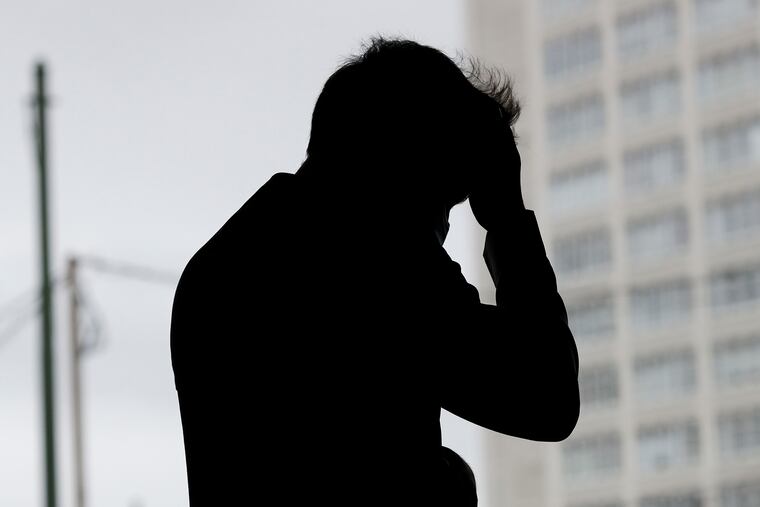A flight to safety, and a family left behind, as an Afghan couple arrives in Philadelphia
"My heart, my mind, everything is out there in Kabul."

Ahmad was begging, pleading, and shouting, frantically waving his passport and visa at the U.S. troops on the wall outside the Kabul airport.
People in the surging crowd held up electric bills, papers, anything that might look official, he said. Luggage and bags were trampled. He and his wife could hardly breathe, crushed among the bodies.
Then one of the troops locked eyes with him.
“You, with the passport!” the American called out, waving Ahmad forward.
Ahmad, 29, carried his wife on his shoulders through the mass of people, toward the troops who pulled her and then him out of throng and into the perimeter, into safety.
“I told them, ‘I have to take my three brothers,’” Ahmad said. “‘The Taliban won’t leave them alive.’”
But his brothers — and here Ahmad pauses, gathering himself to go on — his brothers, who braved gunmen on the streets in their determination to shield him and wife, to get them to the airport, they had no travel documents and were turned away.
They’re still in Kabul. So are his two sisters. And his mother and father.
Only he and his wife, who is 26, managed to get out, ushered with hundreds of others aboard a cramped U.S. military flight.
» READ MORE: Afghan evacuees begin arriving in Philly as supporters rally and plead for those left behind
Four days ago, Ahmad was in a dirty evacuation camp in Qatar, a frequent first stop for rescue flights. Today he’s in a Philadelphia hotel on the edge of Chinatown, trying to make sense of a crisis that’s consumed his homeland and hurtled him and his wife halfway around the world.
Sleep? Not much. Maybe six hours in the last four or five days.
Sitting at an empty table in a closed hotel restaurant Saturday, a few blocks from Independence Hall, he is by turns desolate — “I don’t have hope for life” — and confident, insisting, “Everything will be all right.”
“You have an expression,” he said, meaning the Americans, “‘Everything happens for a reason.’”
Ahmad’s full name is being withheld by The Inquirer for safety reasons.
He’s not certain it will make a difference. He worked as a translator for ANASOC, the Afghan National Army Special Operations Command, which trained and equipped the country’s army.
His name and personal information were logged into computers and records that soldiers abandoned as the Afghan forces collapsed. He figures the Taliban are searching for those records now, or they will be soon.
Before dawn on Saturday, a first wave of hundreds of Afghan evacuees appeared at Philadelphia International Airport. Ahmad and his wife were not among them. Their evacuation flight landed 150 miles away at Dulles International Airport, near Washington.
That was Thursday. The same day, a migration organization drove the couple from there to here, where Ahmad expected to be greeted by an uncle.
But that Pennsylvania uncle is now in Germany. He had gone to attend to a death in the family in Afghanistan, then became trapped when the Taliban took control on Aug. 15. He later made it onto an evacuation flight, but it’s unclear when he’ll be able to return to the United States.
Ahmad will be resettled in the Philadelphia area by Nationalities Service Center, the agency that works to welcome refugees to the region and help them toward self-sufficiency. About 700 Afghans live in Philadelphia, mostly clustered in the Oxford Circle and Mayfair neighborhoods.
“Many of the Afghans on those planes are not only fleeing a despotic regime, they also are fleeing an almost certain death at the hands of the Taliban,” said Margaret O’Sullivan, NSC’s executive director. “It is both a privilege and a particular responsibility for us to stand ready to serve.”
» READ MORE: What to know about the N.J. military base set to shelter thousands of Afghan refugees
Like many new Afghan arrivals, Ahmad entered the country on a Special Immigrant Visa, available to those who had assisted the American military, putting their lives in danger.
He and his wife had failed in their initial attempts to reach the airport, the crowds too huge to penetrate. Taliban fighters seemed to know he worked with the Americans, striking him and his wife with sticks and rubber hoses, shouting, “We won’t let you live!”
At the airport, he kept asking the troops if his mother and father could come with them. The answer was no — then yes, but they would have to get there immediately. Neither one could.
Ahmad feels terrible guilt.
“My heart, my mind, everything is out there in Kabul,” he said. “The Taliban are searching every home. What’s going to happen to my family?”